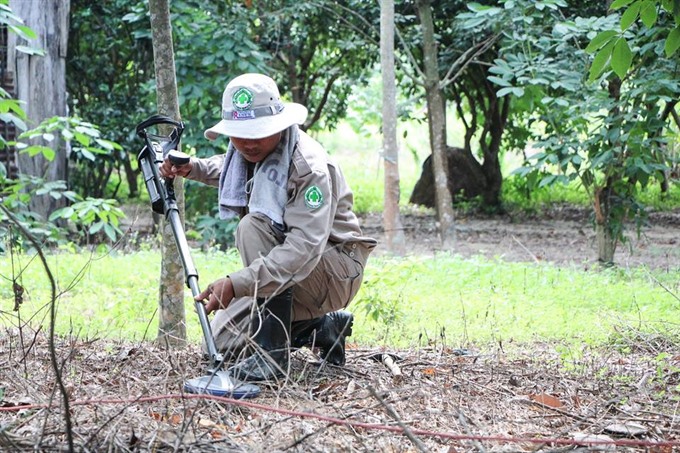 Society
Society

As many as 2,000 people were killed by post-war landmines between 2010 and 2014, while an estimated 6.1 million hectares accounting for more than 21 per cent of Việt Nam’s land remains contaminated with unexploded ordnance (UXO).
 |
| A staff member from Norwegian People’s Aid Vietnam surveys an area contaminated with landmines. — Photo courtesy of NPA |
HÀ NỘI — As many as 2,000 people were killed by post-war landmines between 2010 and 2014, while an estimated 6.1 million hectares accounting for more than 21 per cent of Việt Nam’s land remains contaminated with unexploded ordnance (UXO).
This information was released by Đặng Văn Đồng, deputy director of Việt Nam National Mine Action Centre (VNMAC) under the Ministry of National Defence, at a Friday conference on promoting international partnerships and supporting victims of UXO and Agent Orange (dioxin) in Việt Nam.
Victims of left-over bombs and mines have mostly been in the Central Highlands and central provinces. High-risk groups include children under 16, scrap collectors and people living in isolated areas.
The centre operates a livelihood assistance programme and provides aid of up to VNĐ5 million (US$213) to each landmine victim’s family.
In collaboration with the governments of the United States, Japan, the United Kingdom and other international organisations, capacity building projects for victims are also conducted.
VNMAC focuses on UXO clearance, assistance for landmine victims, communication on UXO prevention and international resource mobilisation.
As the cost for UXO cleanup is high, raising awareness for people living in severely contaminated area is prioritised.
Last October, a project to remedy the consequences of post-war bombs and mines in Quảng Bình and Bình Định provinces from 2018 to 2020 was launched by the governments of Việt Nam and South Korea.
With $20 million of assistance from the Korea International Cooperation Agency (KOICA), the project expects to clear 8,000ha of landmine-contaminated area in Quảng Bình Province and survey 20,000 additional hectares.
Data about victims in the two provinces will be collected to better assess action plans moving forward.
In April, the National Steering Committee on the Settlement of Post-war Unexploded Ordnance and Toxic Chemical Consequences, or Committee 701, under the Ministry of National Defence, was established.
”With Prime Minister Nguyễn Xuân Phúc as the committee’s head and ministers as members, Việt Nam’s Government shows its commitment to overcoming post-war consequences of UXO and toxic chemicals,” said Đỗ Văn Duân, a representative of the committee. — VNS




